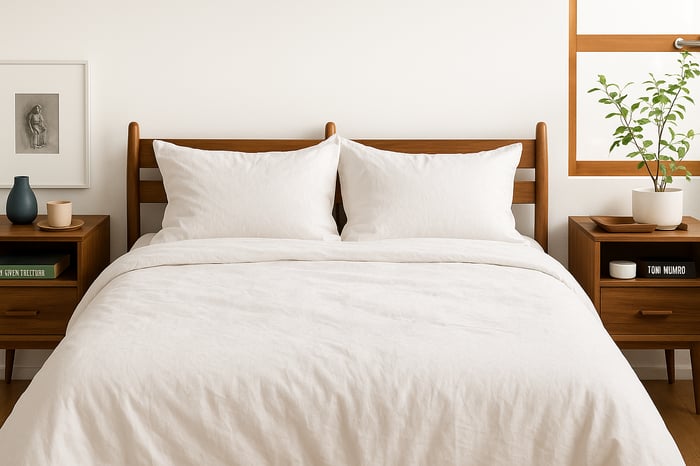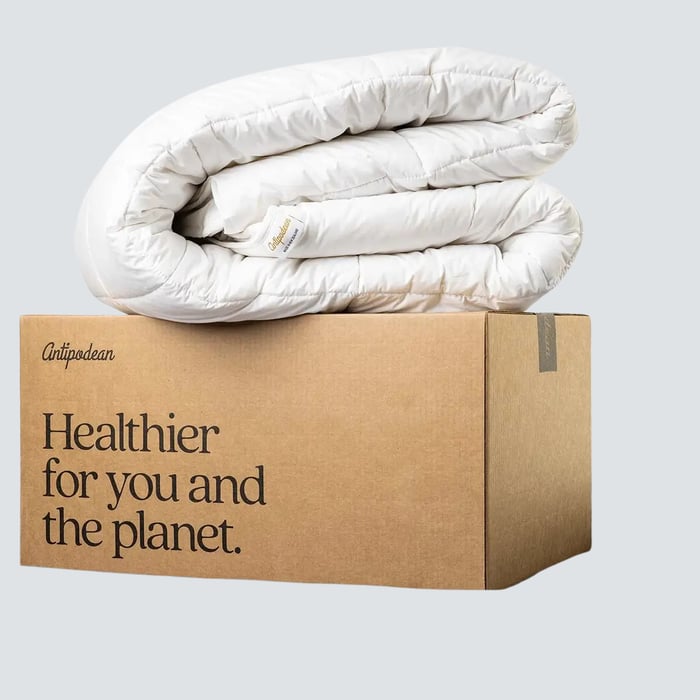Table of Contents
- What to Look For in the Best Wool Comforter
- Types of Wool Comforters (Which One Is Best for You?)
- How to Evaluate Wool Quality (Without Needing a Degree in Textiles)
- Construction Details That Actually Matter
- Care: Wool Is Low-Maintenance
- Conclusion: Choosing the Best Wool Comforter Starts With Knowing What You Need
- FAQs
How to Choose the Best Wool Comforter (Simple Guide for Better Sleep)
Are you tired of waking up sweaty, chilly, or constantly adjusting your bedding? Choosing the best wool comforter can change that almost overnight. A good one doesn’t just keep you warm — it helps you stay perfectly balanced, wick away moisture, and drift into deeper, more restorative sleep.
Here’s the short version:
A high-quality organic wool comforter regulates temperature, breathes naturally, and adapts to your body. The wrong one? Too heavy, too hot, not breathable — basically a sleep saboteur.
This guide walks you through how to choose the best wool comforter for your sleep style, your climate, and your comfort preferences — without the jargon.
Want to compare materials for yourself? Explore our side-by-side guides like Wool vs Down and Wool vs Bamboo to see why natural fibers consistently deliver cooler, cleaner, deeper sleep.
What to Look For in the Best Wool Comforter
These are the core features that actually matter (and actually change how well you sleep).
We’ll keep this simple:
1. Natural Breathability (The #1 Reason Wool Beats Everything Else)
Wool fibers have microscopic pockets that let air move through the comforter instead of trapping heat.
Why this matters:
Helps regulate temperature in both warm and cool seasons
Avoids that “sticky” feeling at night
Our own spun wool Airlay design goes even further — wool is spun into tiny clusters so the airflow is amplified. Learn more about our Bedding for Hot Sleepers Collection.
Organic Wool Comforter | Made in New Zealand, Breathable All-Season Comfort

$342.00
$380.00
Sleep naturally better with our organic wool comforter Unlike down or synthetic comforters that trap heat, our spun wool design wicks away moisture and prevents overheating, so you stay cool & dry. Designed for deeper sleep with a gentle weight… Read more
2. Temperature Regulation for All Seasons
A good wool duvet insert adapts to your body. Warm when you need it, cool when you don’t.
It’s why wool is so popular with hot sleepers and people who run cold — it balances both.
- If you sleep hot: Choose a lightweight wool comforter.
- If you live in a cold climate: Medium or winter weight.
- If you want one comforter year-round: Choose an all-season wool fill.
If you’re looking for cooler, drier nights, explore our Hot Sleepers Collection for breathable, moisture-wicking bedding.
3. Hypoallergenic & Naturally Clean
A true organic wool comforter is naturally resistant to:
Dust mites
Bacteria
Mold
Odor
That makes wool perfect for sensitive skin and allergies, or people trying to avoid synthetics and chemical finishes.
If you’re looking for gentle, irritation-free comfort, see our Hypoallergenic Collection made for sensitive sleepers.
4. Weight & Feel (A Personal Choice)
Some people want a fluffy loft. Others want a “hugged” feeling.
Wool gives you both options without the heavy, swampy feeling of down alternatives.
Tip: A 4–5 lb comforter (like ours) is the sweet spot — grounding, but not bulky.
5. Sustainability & Quality of the Wool
The best wool comforters use:
Organic wool
Regenerative wool. Learn more about regenerative wool and why it matters.
Wool sourced from ethical, low-impact farms
This means cleaner fibers, better breathability, longer durability, and a product that fits into a healthier sleep environment.
Types of Wool Comforters (Which One Is Best for You?)
Lightweight Wool Comforters
Best for:
Hot sleepers
Warm climates
Keeps you dry and cool with gentle insulation.
All-Season Wool Comforters
Best for:
Most people
Homes with AC/heating
Couples with different temperatures
Balances breathability and warmth.
Winter-Weight Comforters
Best for:
Cold winters
People who love a warm cocoon
Those who run cold at night
Still breathable — just loftier.
Regenerative Organic Cotton Sheet Set – Soft, Breathable & Sustainable

$189.00
Softer Sheets. Cleaner Sleep. Our organic cotton sheet set are simply better for the earth, and for your sleep. Grown on low-impact regenerative farms that actively heal the soil, our cotton is then woven and finished responsibly. This process eliminates… Read more
How to Evaluate Wool Quality (Without Needing a Degree in Textiles)
Organic vs Conventional Wool
Organic = cleaner fibers, no chemical residues, better airflow.
Conventional wool is often treated — softer sometimes, but not as breathable.
Merino vs Standard Wool
Merino is finer, softer, and more moisture-wicking.
Standard wool is loftier, slightly heavier, and very insulating.
Regenerative Wool (Your Best Choice)
It’s the softest, most breathable, and most ethical wool available — supporting soil health, biodiversity, and regenerative farming systems.
This is the type we use.
If you’re looking for a cleaner, safer sleep environment, discover our Chemical-Free Collection crafted without harsh chemicals or toxins.
 Clean lines, calm tones, and breathable comfort — our organic wool bedding brings natural balance to your sleep space.
Clean lines, calm tones, and breathable comfort — our organic wool bedding brings natural balance to your sleep space.
Construction Details That Actually Matter
If you want the best wool comforter, look for:
Even fiber distribution (no clumping)
Strong stitching
No chemical finishes
A breathable cotton cover
Good loft that doesn’t collapse
Wool doesn’t need baffle box construction like down — but it does need even carding and airflow throughout.
Care: Wool Is Low-Maintenance
A good wool duvet lasts 10–20 years with simple care:
Always use a duvet cover
Air it out in sunlight
Spot clean only
Only dry clean when absolutely necessary
Store in a breathable cotton bag
Wool naturally resets with airflow — no fluffing needed. Learn more about maintaining a wool comforter in our care guide.
How the Best Wool Comforters Actually Improve Your Sleep (Beyond Temperature Control)
When people search for the best wool comforter, they’re usually thinking about staying warm in winter or cool in summer. But the benefits go deeper than temperature control. Wool has a naturally harmonious relationship with your body’s sleep rhythms — and that’s what turns a good night into a consistently great one.
For starters, wool actively helps stabilise your microclimate — the small pocket of air between your body and your bedding. Synthetic comforters trap humidity in this space, which is why people wake up clammy or sweaty. But a high-quality, breathable wool comforter releases that moisture before it becomes a problem, creating a calm, steady sleep environment that supports continuous rest instead of fractured cycles.
Another benefit: the gentle weight. The best wool comforters have a grounded, soothing feel — not heavy, not stiff — just enough pressure to help your nervous system settle.
Our Airlay design sits around the 5lb mark for a queen, so you get that soft, hugged feeling without the bulk you get from dense winter duvets. If you’re someone who wakes up at 2am with racing thoughts, this kind of pressure balance can make a noticeable difference.
Wool also helps you fall asleep faster. Your body needs to drop its core temperature slightly to initiate sleep, and fibres with natural airflow support that cooldown more efficiently. This is why wool users often report drifting off sooner, especially compared to down or poly-fill alternatives.
Then there’s breathability over time. Even the best down comforters can lose loft and trap more heat as they age. In contrast, regenerative wool maintains its structure and performance for years, which means you’re not buying a boost of comfort — you’re buying consistent, long-term sleep quality.
Conclusion: Choosing the Best Wool Comforter Starts With Knowing What You Need
Finding the best wool comforter isn’t about chasing specs — it’s about choosing the one that helps you sleep deeper, cooler, and more comfortably every night.
Once you understand how wool works (natural airflow, moisture-wicking, gentle insulation) and how to match fill weight, construction, and sourcing to your sleep style, the choice becomes simple.
A premium organic wool comforter gives you breathable comfort in summer, cozy warmth in winter, and a naturally healthier sleep environment year-round. And when it’s made from regenerative wool, you’re not just choosing better sleep — you’re choosing bedding that’s kinder to the planet, too.
If you’re ready to experience that “perfect-balance” feeling — cool when you need it, warm when you want it — explore our collection and find the best wool comforter for your sleep style.
Better sleep starts with better materials. Wool just does it naturally.
Shop Our Organic Wool Comforter
FAQs on Wool Duvet Inserts, Comforters & Sustainable Bedding
What size wool comforter should I choose?
Always match the comforter to your mattress size (Queen, King, etc.), but consider sizing up if you want extra drape and coverage. Many buyers prefer a King comforter even on a Queen bed for a cozier feel.
Are all wool comforters suitable for hot sleepers?
Not all. Look for comforters made with breathable designs like Airlay, which circulate air and wick away moisture. These features prevent overheating and are ideal for hot sleepers.
What’s the difference between merino wool and regular wool in comforters?
Merino wool is finer and softer, offering a more luxurious feel while still delivering the same temperature-regulating benefits. Both are excellent, but merino is often chosen for its silky texture.
How do I know if a wool comforter is truly organic or sustainable?
Check for certifications like GOTS (Global Organic Textile Standard) and ZQRX for regenerative wool. These labels ensure the comforter is free from harmful chemicals and sourced from farms practicing sustainable, ethical methods.
How long will a wool comforter last?
With proper care, a high-quality organic wool comforter can last 10–15 years. Its natural fibers resist clumping and flattening, unlike down alternative or polyester options that often wear out within a few years.
What makes the best wool comforter better than down or synthetic?
The best wool comforters breathe naturally, wick away moisture, and regulate temperature on their own — unlike down or polyester, which trap heat and cause night sweats.
Does wool really help prevent overheating at night?
Yes. Wool fibers release excess heat and moisture continuously, keeping your body in a stable microclimate so you stay cool, dry, and balanced.
What fill weight should I choose for the best wool comforter?
Hot sleepers should pick lightweight fills. Cold sleepers or winter climates benefit from medium or winter-weight wool. Most people prefer an all-season blend.
Are wool comforters good for people with allergies?
Yes. Wool is naturally hypoallergenic, dust-mite-resistant, mold-resistant, and antimicrobial, making it a healthier choice than synthetic alternatives.
What’s the difference between Merino wool and standard wool in comforters?
Merino is softer and finer, offering superior moisture-wicking. Standard wool is loftier and insulating. Both are excellent — but regenerative Merino often delivers the best balance for sleep.




